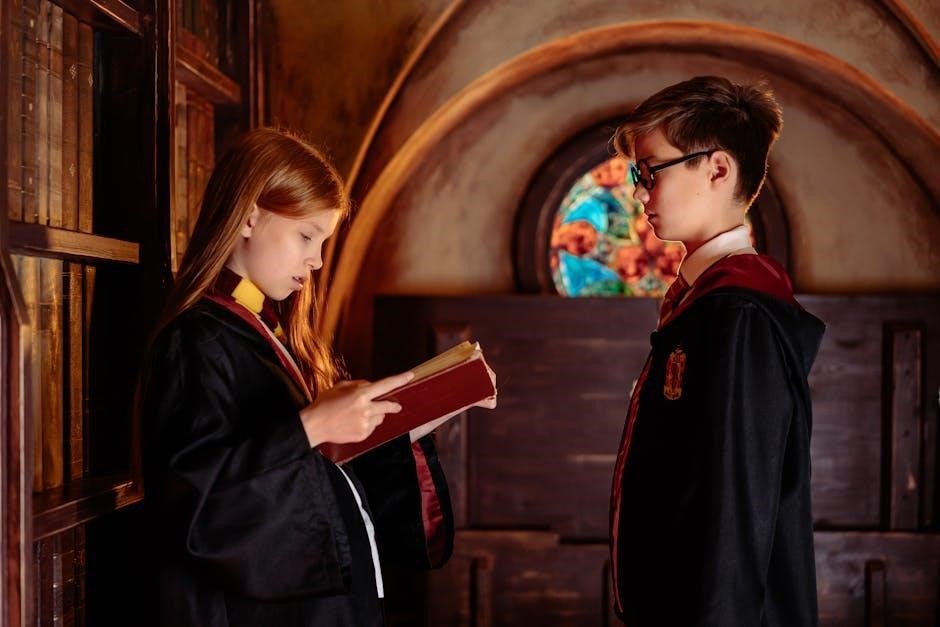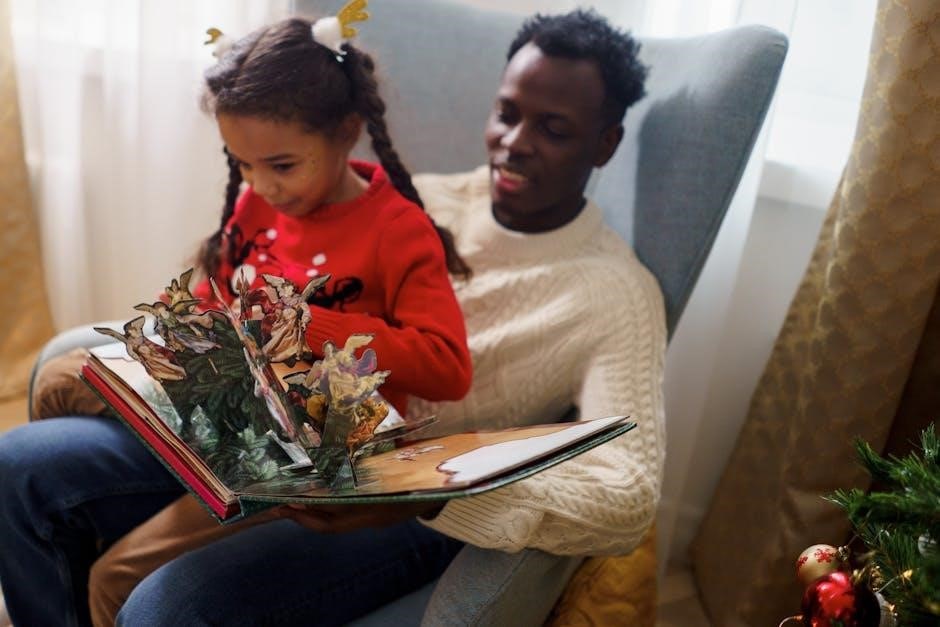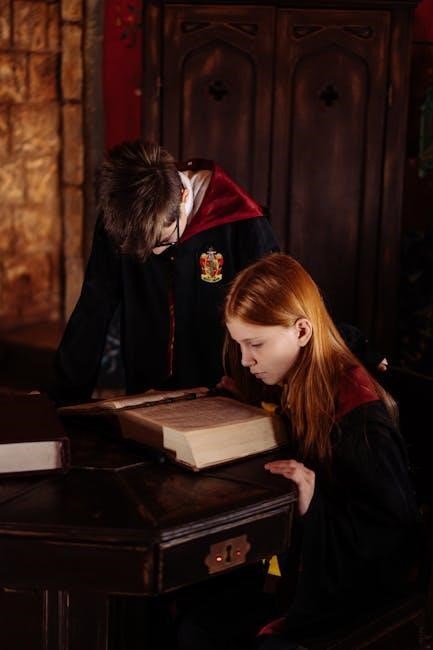Reading Is Magic Book Week 2025 celebrates the transformative power of books, inviting kids, teachers, and parents to embark on a literary adventure.
With its captivating theme, this event fosters creativity, imagination, and a lifelong love for reading through engaging activities, costumes, and shared storytelling experiences.
1.1 Understanding the Theme: Reading Is Magic
The theme “Reading Is Magic” encapsulates the enchanting power of books to transport us to new worlds, ignite imagination, and inspire creativity.
It highlights how reading can transform lives, fostering empathy, knowledge, and personal growth.
By embracing this theme, Book Week 2025 encourages everyone to explore the magical journey of reading, where stories become gateways to adventure, learning, and self-discovery;
This theme is designed to captivate all age groups, reminding us that reading is not just an activity but a timeless, magical experience that unites people across generations.
1.2 The Importance of Book Week in Promoting Literacy
Book Week plays a vital role in promoting literacy by fostering a love for reading among students, teachers, and families.
It creates an engaging environment where stories come alive through costumes, activities, and shared experiences.
By celebrating books, Book Week encourages reading for pleasure, improves literacy skills, and inspires creativity.
Such events help bridge the gap between education and entertainment, making learning fun and accessible for all.
Ultimately, Book Week serves as a powerful tool to nurture lifelong readers and thinkers, shaping a brighter future through the magic of books.
1.3 How to Get Involved in Book Week 2025
Getting involved in Book Week 2025 is an exciting way to celebrate the joy of reading.
Participants can start by exploring the theme, “Reading is Magic,” and planning activities that bring stories to life.
Teachers and parents can organize book-themed events, such as reading marathons, character dress-up days, and literary crafts.
Students can participate in reading challenges, create book-inspired art, and share their favorite stories.
Additionally, communities can collaborate with local libraries and authors to host engaging workshops and discussions.
Everyone is encouraged to embrace the magic of books and make this Book Week unforgettable.

Creative Costume Ideas for Book Week
Bring stories to life with magical costumes inspired by beloved book characters.
From fairy tale heroes to modern superheroes, there’s a character for everyone to embody, sparking imagination and fun.
2.1 Magical Character Costumes for Kids
Kids can transform into their favorite magical characters, from fairy tale heroes to wizards, bringing stories to life.
With DIY costumes like Harry Potter, Alice in Wonderland, or mythical creatures, children can express their creativity and imagination.
These outfits inspire a deeper connection to the books they love, making reading even more enchanting and fun. Parents and teachers can craft these looks together, fostering bonding and excitement for Book Week celebrations.
2.2 DIY Costume Ideas for Teachers and Parents
Teachers and parents can join the magic with simple DIY costumes inspired by beloved book characters.
Classic looks like Hermione Granger or Sherlock Holmes are easy to create with items like scarves, hats, and glasses.
For a whimsical touch, consider dressing up as fictional authors or mythical creatures using cardboard, paint, and fabric.
These costumes not only add fun to the celebration but also inspire students by showing adults’ passion for reading and creativity.
DIY outfits make participation accessible and memorable for everyone involved in Book Week.
2.3 Group Costume Themes Inspired by Popular Books
Group costume themes offer a fun way to celebrate Book Week, fostering collaboration and creativity.
Popular choices include characters from Harry Potter, The Wizard of Oz, or The Jungle Book.
Participants can dress up as their favorite book characters, creating a cohesive and visually striking group look.
Props like wands, hats, or themed accessories can enhance the costumes.
These group themes encourage teamwork, making the celebration more engaging and memorable for everyone involved.
They also highlight the magical and adventurous spirit of reading.

Classroom Activities to Celebrate Reading
Engaging classroom activities, such as reading challenges, book-themed crafts, and author studies, foster creativity and a love for reading, making it a fun and enriching experience.
3.1 Reading Challenges and Competitions
Organize class-wide reading races or individual reading logs to track progress. Introduce competitive and fun challenges, such as “Read Around the World” or “Genre Exploration.” Offer incentives like badges or certificates for milestones achieved. Group competitions, like relay readings or trivia quizzes based on popular books, can foster teamwork and excitement. These activities not only encourage students to read more but also make the experience enjoyable and rewarding, fostering a lifelong love for reading in a magical way.
3.2 Book-Themed Crafts and Art Projects
Transform stories into art with creative book-themed crafts! Students can design custom bookmarks, decorate book covers, or create character-inspired sculptures. Encourage them to illustrate their favorite scenes or make collages from book quotes. DIY projects like paper bag puppets or book page mosaics spark imagination. These hands-on activities allow students to express their love for reading while developing fine motor skills and creativity. Displaying their artwork in the classroom or school library celebrates their connection to the stories they’ve read, making the magic of books come alive in a visual way.
3.3 Author Studies: Exploring Beloved Writers
Dive into the lives and works of cherished authors during Book Week. Conduct in-depth studies of renowned writers, analyzing their writing styles, inspirations, and contributions to literature. Students can create timelines of authors’ lives, write essays about their favorite books, or host discussions about recurring themes. This fosters a deeper appreciation for storytelling and the creative process. By exploring authors like J.K. Rowling, Dr. Seuss, or Roald Dahl, students gain insights into the minds behind their favorite stories, enriching their reading experiences and nurturing a lifelong love for literature.

Engaging Book Week Crafts and Projects
Engaging Book Week crafts and projects inspire creativity and love for reading. Activities like bookmark making, book cover designing, and diorama creation enhance the celebration, making it interactive and fun.
4.1 Making Bookmarks and Book Covers
Creating bookmarks and designing book covers are delightful activities that spark creativity. Use colorful materials like cardstock, stickers, and stamps to craft personalized bookmarks. For book covers, decoupage, fabric, or paint can transform plain covers into magical designs. Students can decorate bookmarks with their favorite characters or motivational quotes. These crafts not only foster creativity but also encourage students to treasure their books. They make thoughtful gifts or keepsakes, promoting a deeper connection to reading. Such hands-on projects are ideal for all ages, making Book Week a memorable celebration of literacy and imagination.
4.2 Creating Book-Inspired Dioramas
Book-inspired dioramas bring stories to life in a three-dimensional format. Students can use shoe boxes or cardboard to create scenes from their favorite books. Decorate the inside with painted backgrounds, miniature characters, and small props. Encourage creativity by adding details like furniture, landscapes, or symbolic objects from the story. This activity helps students visualize narratives and connect deeply with the plot and characters. Displaying dioramas in classrooms or libraries fosters a sense of pride and sparks conversations about literature. It’s a fun, interactive way to celebrate the magic of reading and storytelling.
4.3 Designing Magical Book Week Posters
Designing magical Book Week posters is a fun way to celebrate the theme “Reading Is Magic.” Encourage students to use vibrant colors, creative imagery, and catchy slogans. Incorporate iconic book characters, magical landscapes, or symbolic elements like wands, stars, or open books. Use markers, glitter, or digital tools to make the posters eye-catching. Display them in classrooms, libraries, or hallways to create a festive atmosphere. This activity fosters creativity and excitement, inspiring others to explore the enchanting world of books and reading.

Storytelling and Performance Ideas
Storytelling and performance ideas bring books to life, fostering imagination and engagement. Students can act out favorite scenes, create puppet shows, or host interactive readings.

5.1 Hosting a Storytelling Session
Hosting a storytelling session is a delightful way to captivate students during Book Week. Create a magical atmosphere with dim lighting, cozy seating, and themed props. Encourage students to share their favorite stories or create new ones inspired by beloved books. Teachers can model expressive storytelling techniques, such as voice modulation and gestures. Invite students to participate by acting out scenes or contributing to group stories. This interactive approach fosters creativity, public speaking skills, and a deeper love for storytelling. It also allows students to connect with characters and narratives on a personal level, making reading even more enchanting.
5.2 Dramatic Readings of Favorite Books
Dramatic readings bring stories to life, engaging students and fostering a deeper connection with literature. Choose popular books or excerpts that resonate with your audience. Encourage students to take turns reading aloud, using expressive voices and gestures to convey emotions. Assign roles for character dialogue to make it interactive. Teachers can model fluent reading techniques, while students practice public speaking and comprehension. Add sound effects or background music to enhance the experience. This activity not only boosts confidence but also makes reading a shared, magical experience for everyone involved.
5.3 Puppet Shows Based on Book Characters
Puppet shows are a delightful way to bring book characters to life during Reading Is Magic Book Week. Students can create their own puppets using materials like socks, paper bags, or cardboard. These puppets can represent beloved characters from popular books. Performances can retell favorite stories or create new adventures, fostering creativity and storytelling skills. Assign roles like puppeteers, narrators, or sound effect managers to engage everyone. This interactive activity not only entertains but also enhances comprehension and enthusiasm for reading, making it a magical experience for all participants.

Book Week Event Planning
Organizing Book Week events requires creativity and coordination. Collaborate with teachers, students, and the community to ensure a memorable celebration that fosters a love for reading.
6.1 Organizing a Book Fair or Marketplace
Organizing a book fair or marketplace is a fantastic way to celebrate “Reading Is Magic” Book Week. Start by selecting a venue and setting dates. Coordinate with local publishers, authors, and schools to showcase a variety of books. Create themed sections, such as Magic Genre Alley or Spellbinding Stories Corner, to captivate visitors. Include interactive activities like author meet-and-greets, reading sessions, and book signings. Promote the event through posters, social media, and school newsletters. Encourage community participation by inviting book clubs and literacy organizations. Make it a magical experience with decorations, music, and a festive atmosphere that celebrates the joy of reading!
6.2 Planning a Book Week Assembly
Planning a Book Week assembly is a key event to celebrate “Reading Is Magic.” Start by setting a theme and date, ensuring all students and staff are involved. Invite guest speakers, such as authors or illustrators, to inspire the audience. Organize performances like skits, poetry readings, or book-themed songs. Encourage students to share their favorite books or characters. Promote the event with posters and announcements. Make it interactive with quizzes or trivia related to popular books. Ensure the assembly is engaging, fun, and reflects the magic of reading, fostering a love for literature in everyone.
6.3 Coordinating a Reading Marathon
Coordinating a Reading Marathon is an exciting way to celebrate “Reading Is Magic.” Choose a date and duration that suits your audience, such as a full school day or weekend. Select a variety of books, including popular and magical themes, to cater to different age groups. Create a cozy reading environment with themed decorations. Encourage participation by offering breaks with snacks and activities like book trivia or themed games. Provide incentives, such as certificates or prizes, for those who read the most or complete a challenge. Promote the event through posters, social media, and announcements to maximize involvement and enthusiasm.
Technology Integration in Book Week
Integrate technology into Book Week with digital book clubs, interactive reading challenges, and online author Q&A sessions. Use educational apps and multimedia tools to enhance engagement and learning.
7.1 Using Digital Tools for Book Reviews
Digital tools can transform book reviews into engaging and interactive experiences. Students can use platforms like Google Docs or Padlet to share their thoughts and collaborate on group reviews. Interactive presentation tools such as Prezi or Canva allow for visually appealing summaries. Additionally, digital whiteboards like SMART Boards enable real-time discussions and feedback. Encourage the use of audiobooks and e-readers, which often feature built-in highlight and note-taking options. These tools not only enhance participation but also make the review process more accessible and fun for all ages, fostering a deeper connection to the stories they explore during Book Week.
7.2 Creating Book Trailers and Videos
Book trailers and videos are dynamic ways to engage students during Book Week. Using tools like BookCreator, iMovie, or Canva, students can craft compelling trailers that highlight key scenes, characters, and themes. They can collaborate in groups to script, film, and edit their projects. These creations can be shared on school websites, social media, or during assemblies. This activity not only fosters creativity but also enhances digital literacy. It encourages students to think critically about stories and share their interpretations with the community, making reading a fun and interactive experience for everyone involved.
7.3 Online Book Discussions and Forums
Online book discussions and forums offer a modern way to engage students and communities in Book Week. Platforms like Google Classroom, Edmodo, or dedicated forum sites can host discussions. Teachers can create themed discussion threads, such as “Magical Worlds in Literature” or “Favorite Book Characters.” Students, parents, and educators can share insights, ask questions, and participate in polls. These forums foster a sense of connection and deepen understanding of books. They also provide a space for shy students to voice their opinions, making reading a shared and inclusive experience for everyone involved.

Involving the Community
Involving the community in Reading Is Magic Book Week fosters connections and shared excitement for literacy. Local businesses, libraries, and organizations can collaborate to create engaging events and activities.
8.1 Partnering with Local Libraries
Collaborating with local libraries for Reading Is Magic Book Week can enhance the celebration by leveraging their resources and expertise. Libraries often have extensive book collections, experienced staff, and event spaces that can host author visits, storytelling sessions, or book-themed workshops. Partnering with libraries allows schools to access a wider range of books and organize joint events, such as reading challenges or book fairs. This collaboration also fosters a sense of community and promotes literacy beyond the classroom. Libraries can further support by providing book recommendations, hosting reading marathons, or offering craft activities tied to popular children’s literature.
8.2 Inviting Guest Authors or Illustrators
Inviting guest authors or illustrators to participate in Reading Is Magic Book Week can inspire students and deepen their connection to literature. These visits provide unique opportunities for children to meet creators of their favorite books, gain insights into the writing process, and learn about the craft of storytelling. Authors and illustrators can conduct workshops, share their creative journeys, and engage students in interactive sessions. Such events not only spark imagination but also motivate students to explore writing and art, fostering a lifelong love for reading and creativity. This enriches the educational experience and makes Book Week memorable.
8.3 Hosting a Family Reading Night
Hosting a Family Reading Night is a wonderful way to foster a love for reading and strengthen family bonds. Create a cozy atmosphere with dim lights, comfy seating, and themed decorations. Families can share favorite books, participate in reading challenges, or enjoy storytelling sessions. Offer refreshments and activities like book-themed crafts or trivia games. This event encourages families to prioritize reading together, creating lasting memories. It also provides an opportunity for parents to model reading habits and inspire their children to explore the magic of books. Make it engaging and fun for all ages!

Book Week Ideas for Different Age Groups
Book Week can be tailored to different age groups, ensuring all participants enjoy engaging activities. Younger students can explore picture books, while teenagers delve into complex themes. Adults can join discussions or reading challenges, fostering a community-wide celebration of reading.
9.1 Activities for Younger Students
For younger students, Book Week can be a magical experience with age-appropriate activities. Storytime sessions featuring popular children’s books, such as Where the Wild Things Are or The Gruffalo, can spark imagination. Craft workshops allow kids to create bookmarks, book covers, or character masks. Reading scavenger hunts and rhyme games make learning fun. Interactive storytelling with puppets or costumes encourages participation. These activities help build a lifelong love for reading in a playful and engaging way.
9.2 Engaging Teenagers with Book Week
Engaging teenagers during Book Week requires activities that resonate with their interests. Book clubs focused on popular young adult novels can foster discussions. Creative writing contests with magical themes encourage self-expression. Hosting author Q&A sessions via video calls or live events can inspire teens. Incorporating graphic novels and comic book workshops taps into their visual storytelling preferences. Debates on literary characters or modern issues in literature can spark critical thinking. These activities ensure teens feel connected and valued during the celebration.
9.3 Involving Adults in the Celebration
Involving adults in Book Week fosters a sense of community and shared joy in reading. Encourage adult book clubs to participate in discussions or host author talks featuring guest speakers. Organize reading challenges or literary trivia nights tailored for adults. Invite parents and educators to volunteer for events or share their favorite books with students. This not only strengthens connections but also highlights the magic of reading across generations, making the celebration inclusive and impactful for everyone involved.

Assessing the Impact of Book Week
Evaluate the success of Book Week by measuring participation rates and student engagement. Use surveys and feedback forms to identify strengths and areas for improvement, ensuring future events are even more impactful.
10.1 Measuring Student Engagement
To measure student engagement during Book Week, track participation rates in activities like reading challenges and crafts. Use observation checklists to assess enthusiasm and involvement. Distribute feedback forms to gather insights on favorite activities and perceived benefits. Monitor reading logs to see if students explored new genres or authors. Analyze creative outputs, such as posters or dioramas, to gauge understanding and interest. Finally, conduct informal discussions to capture students’ overall enjoyment and how the event sparked their love for reading. This data helps refine future Book Week celebrations.
10.2 Gathering Feedback from Participants
Gathering feedback from participants is crucial for understanding the success of Book Week. Use surveys or questionnaires to collect insights from students, teachers, and parents. Include both open-ended questions and multiple-choice options to capture diverse perspectives. Conduct focus groups to delve deeper into experiences and suggestions. Encourage anonymous submissions to ensure honesty. Analyze the feedback to identify strengths, areas for improvement, and popular activities. This data is invaluable for refining future events and ensuring they align with participants’ interests and expectations. Feedback helps create a more engaging and impactful Book Week celebration.
10.3 Planning for Future Book Week Celebrations
Effective planning is key to ensuring successful future Book Week celebrations. Start by setting clear objectives aligned with literacy goals and community engagement. Engage stakeholders early to foster collaboration and diverse perspectives. Develop a detailed timeline and budget, allocating resources wisely. Incorporate innovative themes and activities to maintain excitement. Utilize feedback from previous events to refine plans and address past challenges. Establish a robust marketing strategy to promote the event widely. Finally, prepare contingency plans to adapt to any unforeseen circumstances, ensuring a seamless and impactful celebration.

About the author